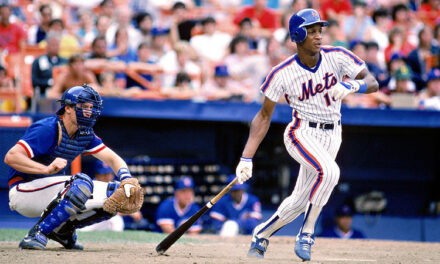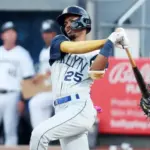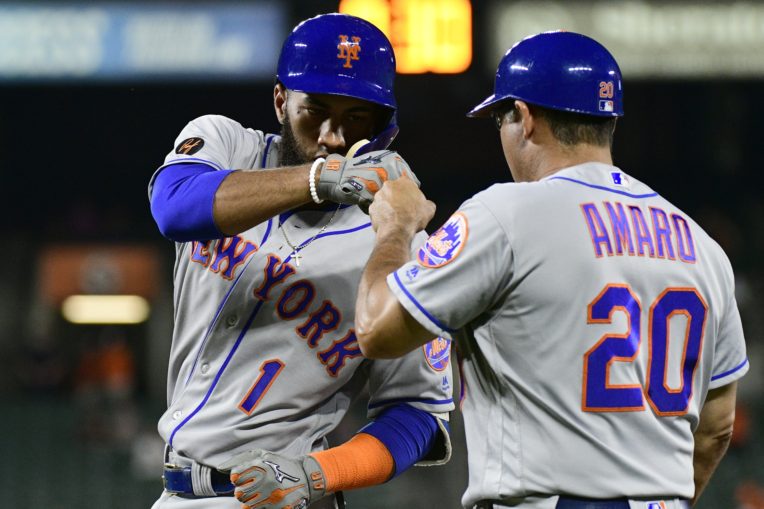
Take a peek at Ruben Amaro Jr.’s resume and you’ll find an individual who’s experienced a multitude of roles in Major League Baseball.
From spending parts of eight seasons as an outfielder for the California Angels, Cleveland Indians and Philadelphia Phillies, to serving as assistant general manager for the Phillies for 10 seasons before taking over as GM in November 2008, to spending three seasons as first base coach for the Boston Reds Sox and New York Mets; Amaro’s enjoyed many facets of the game from varied perspectives.
Amaro, 55, was predisposed to Major League Baseball since he was born. His father, Ruben Amaro Sr., played for four teams over his eleven-year Major League career in the 1950s and ’60s, winning a Gold Glove at shortstop with the Phillies in 1964.
His pro career lasted until 1971 when the elder Amaro became a full-time scout in the Caribbean and later the Latin American coordinator for the Phillies. Amaro then served as the Phillies’ first base coach from 1980-81, in which Amaro Jr. got an up-close look at a major league clubhouse when he was one of the team’s batboys.
The young Amaro got to experience the ultimate thrill as a teenager: watching his beloved Phillies win their first World Series Championship in 1980.
The Philadelphia native went on to attend Stanford University, where he was part of the university’s first championship in 1987. That same summer, Amaro was drafted in the 11th-round by the California Angels.
Amaro spent parts of eight seasons in the majors, with his last coming in 1998 with the Phillies. Upon his retirement, Amaro knew that he wanted to remain in the game in some capacity, but was shocked when then-current GM Ed Wade proposed that Amaro join the front office as an assistant general manager.
Following the Phillies’ second World Series championship in 2008, Amaro was given the reigns as general manager, replacing the retiring Pat Gillick. His seven-year stint as GM started off on a high note: winning the National League pennant in 2009 and returning to the World Series for the second-straight year.
The Phillies would make it back to the postseason two more times under Amaro’s tenure, losing to the San Francisco Giants in six games in the 2010 National League Championship Series, and losing in five games to the St. Louis Cardinals in the 2011 National League Division Series.
With less than a month left of play in 2015, the Phillies relieved Amaro of his GM duties, as the club was heading for its second-straight last-place finish in the National League East.
Amaro had long thought about one day transitioning to the field, with aspirations of managing at the big league level. A little more than a month after his dismissal in Philadelphia, the Red Sox hired the former GM to be their first base coach, a position he served from 2016-17.
For the 2018 season, Amaro swapped roles with longtime Mets’ first base coach, Tom Goodwin, and came to the Big Apple. After his lone year on the field with the Mets in ’18, Amaro went back to the front office, this time working as a special assistant to newly hired GM, Brodie Van Wagenen.
Amaro and the Mets went their separate ways following the 2019 season. There were reports that Amaro was headed to television as a studio analyst with NBC Sports Philadelphia for the 2020 season, which Amaro admits could still be a possibility.
The baseball lifer wants to continue forging his path in Major League Baseball, with aspirations of one day managing at the big league level. Wherever he winds up, Amaro just wants to remain in the game that has afforded him the opportunities to experience baseball from so many different levels.
I had the pleasure of speaking with Amaro where we discussed how influential his father was on his career, his tenure at Phillies’ GM and working on the field as first base coach for the Mets.
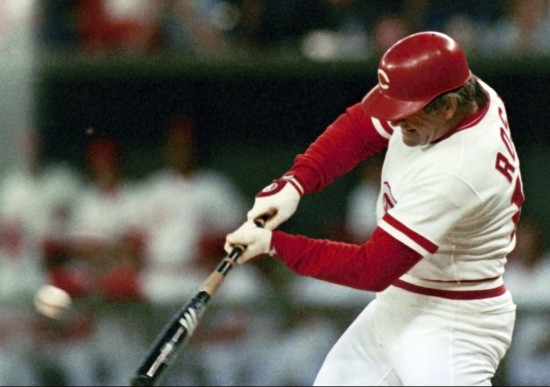
MMO: Who were some of your favorite players growing up?
Amaro: When I was a batboy for the Phillies and my dad was working for them, I would say Mike Schmidt was probably one of my favorites. He was an easy one to really like.
One of the guys I really liked in that ’70s and ’80s era was a guy named Bake McBride. He was awesome and he was our right fielder. Gary Matthews was fun to be around.
There were so many really good players like Pete Rose. An interesting story about Pete Rose: He didn’t have a whole lot of stuff in his locker, but when my dad was a coach, he actually had a picture of my dad’s baseball card in his locker stuck on his nameplate. I thought that was pretty neat. But my dad was the first base coach at the time, and he’d hit him ground balls all the time.
Steve Carlton was phenomenal and Tug McGraw and those guys. That ’80 World Series team was pretty special, and I was about 15 years old at the time so those were like my childhood heroes.
MMO: You grew up in a baseball household, as your dad played in the majors over parts of 11 seasons and then worked for the Phillies in several capacities including scout and first base coach. What was it like growing up having a father in Major League Baseball, and how did that help influence your eventual career path?
Amaro: It’s interesting, we never really thought it was anything abnormal to be on a baseball field around Major League players. From being in the clubhouses in Yankee Stadium, Angels Stadium and then in Philadelphia where my dad was there for a long time. We were just around baseball all the time and we thought that was normal.
That was a normal way of growing up, but we were also well-taught and well-tutored by my dad. He had a lot of great advice for us: keep your eyes open, keep your ears open and try to keep your mouth shut, which I had a little bit more trouble with than my brother had. [Laughs.]
Just being around the clubhouse and being around that atmosphere just became a very natural place for us to be.
As a kid, I thought I’d end up being a soccer player, that was kind of my first love. But as I became more and more aware and more of a fan of the game, I ended up thinking that baseball might be the route to take. Even though I was probably a little less talented in that area, it kind of became my one love.
MMO: What are your memories from the 1987 MLB Draft? Did you have any notion that the Angels were looking to select you?
Amaro: I talked to a couple of clubs. Jesse Flores was a scout that scouted me; I had filled out one of those information things. I heard from a couple of different scouts and my dad heard from a couple of different teams, I think the St. Louis Cardinals and one or two others.
I ended up dropping to the eleventh round and got taken by the Angels while we were at the College World Series, so that was a pretty interesting time for us. We ended up winning the World Series that year, which was my senior year when I was at Stanford.
I can’t remember exactly, but I think we were right in the middle of the World Series, which was in Omaha when I got the phone call at the hotel from Jesse Flores that I had been drafted. It was exciting to get my career going.
MMO: Can you talk about your eventual transition to the Phillies’ front office in 1998?
Amaro: It’s an interesting story. During spring training of ’98, I was kind of fighting as a non-roster invitee to make the club. I had gone to Ed Wade, who at the time went from interim to the official GM, and in spring training he had not hired a lot of people to support him.
I went in during the course of that spring and I just wanted to let him know that I was probably coming towards the end of my career and that I wanted to stay in baseball. I was thinking maybe as a scout or minor league coach or something like that. He actually asked me in that meeting that we had whether I had interest in being in the front office and work as one of his assistants. I was flabbergasted!
I ended up making the team, graciously they let me make that team, and I ended up talking to Ed over the course of that entire season while we were playing. I talked to my family and decided after Ed offered me that opportunity to become the assistant GM, which was kind of crazy to do right off the field and have that kind of position. I figured I probably wouldn’t get that opportunity again, so I better take it!
I was very, very fortunate that people like Ed Wade and Dave Montgomery were supportive of me staying in the organization.
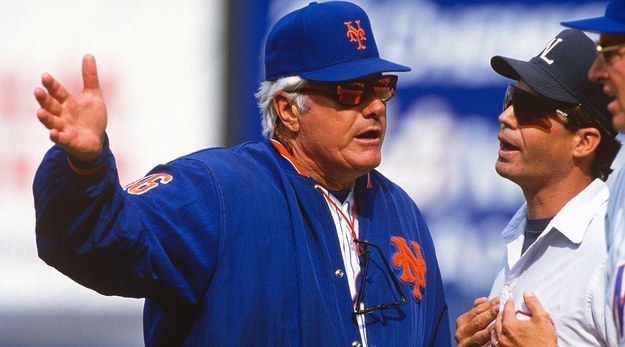
MMO: How was that initial transition from being a player to now working in the front office? Was it a lot of learning on the job?
Amaro: During the course of the time I was talking to Ed during the year I started reading about the basic agreement and getting familiarity with the rules and things like that to try to hit the ground running. But I have to give Ed a lot of credit for kind of just throwing me in the mix there.
Immediately one of my first jobs was to try and sign some six-year minor league free agents and Ed just said, “Go and start negotiating.”
I think that was the best way to try and start that process; you’ve just got to throw yourself into the fire. I was working with Ed and Dallas Green was one of our senior advisors at the time and Paul Owens. I got to spend a lot of time talking about the job at hand and what it takes, and I had some great teachers in Paul, Ed, Dallas Green and some of the background from my father. It was nice to have those people around to support me.
MMO: What’s something about the GM position that might surprise fans to hear?
Amaro: I think in the Philadelphia Phillies’ organization we were so community-oriented. I had grown up in that city and I felt that for me, it was one of those things that we did a lot of community service and I felt like it was my job as a GM to sort of be the face of the organization. And so we had events to go to.
Not only did you have your typical 9 to 11 job, but on top of that, David Montgomery was very active in the organization and in the community, so we were doing a lot of those things.
I think the interactions I had with our vice presidents, the communications are not just vertical. You’re not just communicating vertically in your organization, we were one of those organizations that tried to have everyone on the same page.
All the VPs and all the relationships I’ve had with these people, they’re like brothers and sisters to me. We had a lot of communications horizontally in that way as VPs and I thought that made for a really strong, united organization where people knew what direction we were trying to take and why and there was a lot of input and interaction in that way.
MMO: Certainly your schedule and daily responsibilities varied, but what did a typical day-to-day schedule look like for you as GM?
Amaro: After a night game and if it was a home game, you’d get in somewhere between 9 and 9:30. One of the things I used to do a lot is when I walked into the stadium, we had a downstairs parking area, and I’d come up through and into the stands and I’d just sit there and look at the ballpark. Particularly when we were in the new ballpark at Citizens Bank, and I’d just marvel at the fact that I got to be a really big part of this organization and the fact that I was heading their baseball organization. I never took that for granted.
I would often sit down in one of the seats to just think about how fortunate I was to be in that position. I never regretted anything as far as the effort part was concerned, other than some of the decisions obviously that you didn’t make to have you be let go.
I think more than anything else I took a lot of pride in being the head of the organization, particularly during a time that was arguably one of the best eras of our organization’s history. I feel very fortunate to have been a part of that.
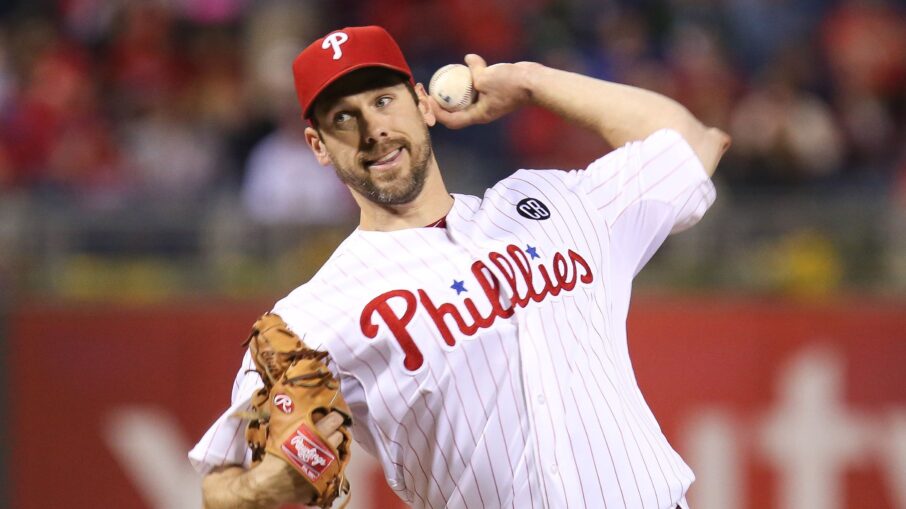
MMO: During your time as GM, what would you say was your best and worst move?
Amaro: Well probably most of them involved Cliff Lee. The Lee trade when we got him in ’09, I think that was a big move for us. We were shooting for Roy Halladay, we were looking for frontline pitching. And the fact that we ended up getting Cliff in that deal, I thought that ended up being a heck of a deal for us.
I loved being able to make that Halladay deal as well, that was also a great deal for us. I was pretty happy with a lot of different things that we got to do. Those, in particular, were pretty exciting for us.
And then when we ended up trading Cliff before we signed him a couple of years later, that was a tough move for us. That was probably one of the ones I would regret, just because I would’ve rather had taken more time to get more prospects that were closer to the major leagues. We got three pretty damn good prospects from the Mariners, but they didn’t really pan out the way we thought they might even though they were outstanding players. They were still in A-ball and were pretty far away from the majors.
That would be something that I would have liked to have done a little bit better but you make decisions for a reason. One of the reasons that we made that deal was because we didn’t want the fans to think that we were going to end up with both Lee and Halladay because we just had to replenish our organization at the time, and that was kind of the mandate.
MMO: I feel like a big part of handling the role as general manger is just having thick skin.
Amaro: We’re all human beings and we all have feelings and such. The only issues I ever had at times were when some of the pundits would get personal with some of the criticisms.
But honestly, I was born and raised in Philadelphia, I knew what the expectations were. I remember telling my two daughters when I first got the job as GM, I said, ‘Girls, they’re going to love your dad for about three or four years, and then they’re going to hate your dad.’
It was pretty prophetic I guess. [Laughs.]
I was pretty well used to it and I think it was my job to be forthright and be available to the press. Was I snippy at times and did I get a little moody? That’s possible. But I think overall I was pretty prepared.
I knew how difficult the fanbase is and how demanding the fanbase was and that’s their right. That is your God-given right to be able to criticize and I was well prepared for that. Does it hurt at times? Sure. I mean, we’re all human beings, but it’s par for the course. That’s an occupational hazard in Philadelphia.
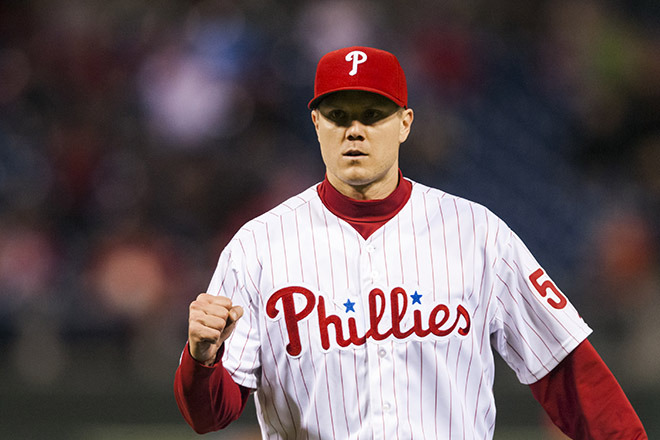
MMO: During the latter part of your time as Phillies GM, you were in rebuild mode. Can you talk about the decision and then the overall process to go about and readjust how the organization is essentially run when you know that the team is not necessarily going to be a contender on a year-to-year basis?
Amaro: I think that after the 2012 season we were still trying to hang on to a couple of different things. We had a couple of things going on, one of them frankly was the contract we were trying to put together for Comcast. It was very difficult for us to be negotiating that contract and to go into a rebuild when we were sort of at the tail end of that run.
In 2012, we signed Jonathan Papelbon, which was a big sign for us. We felt like we were still on the right track, but we couldn’t get Chase Utley back and healthy unfortunately and we couldn’t get the other big piece in Ryan Howard. And then we had Halladay go down.
When we had those three guys go down it made it very, very difficult for us to regroup. Had they not gone down we probably would’ve tried to stay and hang in there one more year, but once they became not as healthy and turning a little bit older, then we made that decision.
I think it was in 2014 that we started to, perhaps a year late. You’re trying to win every year and there’s an expectation in Philadelphia to try and continue to win and that’s what I felt my job was.
I guess in retrospect maybe we should’ve started the transition a little earlier, had they been healthier we might’ve been able to do that, but we were kind of caught between a rock and a hard place and that’s how things go in baseball and in sports sometimes. You have to try and adjust.
I felt like with some of the moves we made with the Jimmy Rollins trade and also with the Cole Hamels trade we started to turn things around as far as the transition and rebuild were concerned. Unfortunately, at that time, they let me go and I wish in retrospect I would’ve loved to have tried to finish off that rebuild, but this is all part of the game.
Sometimes we get hired to get fired.
MMO: Since your departure from the Phillies, do you look back at the players and prospects you were able to acquire who have made an impact with the current club and take some pride in that?
Amaro: Some of them are pretty decent pieces and we ended up drafting okay. The Aaron Nola draft was a big one for us along with the Scott Kingery draft and some of the other guys like Rhys Hoskins while we were there.
There are some people that are there and we made some deals that helped the club. We had Zach Eflin, we had Jerad Eickhoff, who before he got hurt was actually on target to be a pretty darn good pitcher we thought.
There were some other guys that didn’t really pan out much, but then Jorge Alfaro ended up being a pretty big piece for the J.T. Realmuto trade.
It takes a village. It’s the scouting people, it’s the pro scouting, amateur scouting, all of those people that really take a big part and should get a lot of credit for that as well.
MMO: Looking back on your tenure as GM, is there one thing you wish you had done differently or incorporated more? Analytics is one thing I’ve heard you say in the past that you wish you incorporated more as GM. Can you expand on that a bit?
Amaro: We started the process and we ended up developing probably a little later than most organizations. We probably could’ve started a little bit earlier. We did have and did use analytics, it was more proprietary; we didn’t like to talk about it. It wasn’t as advanced and big data as maybe some of the others, but we did utilize, just like any other organization, statistics and some analytics in our decision-making.
Was it fully developed enough at the time? Probably not. We were starting to go through that process when I was let go and we were in the middle of actually building the Phillies’ holistic integration location called “PHIL.” I’m not sure if they’re still utilizing that and have it, but we started going through that process before I was let go. We were about a year into the process.
Now in retrospect, that I’ve got an opportunity to be on the field and to see other organization’s work and see how players are processing information and how much information is out there, I think that there is a whole heck of a lot of information that would’ve been helpful.
But again, for me, it’s about not just having the information but utilizing it the proper way just like anything else. Just like any piece of information whether it’s from a scout, player or whether it’s information from the analytics and R&D people; it’s not necessarily what it is it’s how it’s being utilized and whether it’s being utilized in an efficient way to really improve clubs.
To me, it’s gotten to the point where as I’ve analyzed more and more of the front offices and the way people are going about them, the ones that are having the most success are the ones that can blend both the analytics and big data with good old fashion scouting and evaluation. Being able to utilize the basics of what is necessary to be successful as an organization, and blending that with some of the newer data that’s out there.
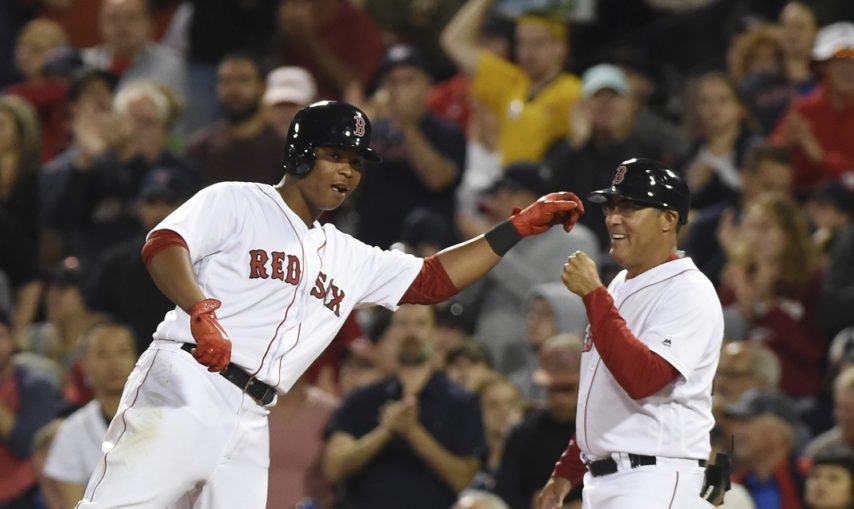
MMO: How did you come to land the first base coach position for the Red Sox back in October 2015?
Amaro: One of the things that I thought about a lot when you’re up there Monday morning quarterbacking in the office 500 feet from it all, I always felt like I was a little bit of a student of the game ever since I was on the bench for most of the teams that I played for. Watching and observing. I think you do the same thing as a GM: observe and help people go about their business.
I always loved the idea of being back on the field and I had mentioned it to my agent that I had some interest in being out there and being considered as a possible future manager. I threw it out there and I think it was picked up by somebody in Boston. The late Nick Cafardo wrote it in one of his blogs.
I think John Farrell read it and he gave me a call and asked me if I’d be interested in being a coach there because they had a vacancy. I had known John for a long time on a couple of different levels as a player in Buffalo and I think even in Charlotte when we played together there. I had known him as a front office guy when he was with the Cleveland Indians in their minor leagues and as a coach and manager.
I went up to Boston and had an interview with him and we talked baseball. I talked to Dave Dombrowski and all of a sudden I was the first base coach working on the outfield and some baserunning stuff.
It was great, I loved it there. It’s a great organization, it’s one of the best organizations in all of sports. They treat their people extraordinarily well. I got to learn a lot about how players think and what motivates them and built what I thought were some really great relationships there.
We won two divisions in a row which was exciting. They made some changes after that and Dave brought in Alex Cora and John was gone so we kind of got swept out of there. But I enjoyed it there, great organization, great people, and it was a really nice organization to be with for two years.
MMO: Following the 2017 season, you essentially switched jobs with Tom Goodwin, who had been the Mets’ first base coach. Goodwin went to Boston and you came over to New York. How did you like working for the Mets and being in New York?
Amaro: I really enjoyed it. Met some really great kids in Michael Conforto, Brandon Nimmo, and some others there. Nice energy, good kids there, I got a chance to work with a good friend of mine in Gary DiSarcina.
Mickey Callaway brought me over there when I interviewed. I talked to J.P. Ricciardi who I’ve known for a long time and John Ricco. Obviously, I knew Sandy Alderson quite well over the years. He brought me in for the interview and I got the chance to talk baseball with them.
One of the guys I really enjoyed being around was Amed Rosario. Great energy, good kid, willing to learn. Amed, Michael and Brandon were good guys to be around.
I enjoyed that time there and then I went on into the front office with Brodie.
MMO: You mentioned how you went on to work in the front office under Brodie Van Wagenen for the 2019 season. What were some of your responsibilities?
Amaro: I was his special assistant. He had asked me to do some scouting stuff, I was involved in some of the player personnel stuff in spring training.
It was a little bit of jack of all trades. I was doing a little bit of advance work during the spring and into the early part of the season in 2019, and then did some acquisition scouting; I was in charge of the National League as a pro scout. I was traveling all over the country to major league clubs. That was something I had not done full-time before, but it was another opportunity to learn something different and try to give Brodie as much information as I could and advice as I could.
Brodie had an interesting first year that ultimately ended up being fruitful for him. I think they’re on the right track and it’ll be an interesting National League East.
MMO: Circling back for just a second, while you were the first base coach for the Mets (and Red Sox), you also worked as the club’s baserunning and outfield coach. Can you talk a bit about some of those responsibilities during the course of a season?
Amaro: You do a lot of different things. One of the things that we tried to instill is the type of culture on the bases that you really wanted to try and be as good a baserunner as you could possibly be.
One of the things that were important for me in my capacity as a GM was to try and set a tone baserunning-wise. Both stealing bases and running the bases was an important element of how you set a tone as an organization. You try to set that culture as much as we possibly could, and I think that was an important element of trying to bring a certain style of baseball to New York.
One of the things that I took a lot of pride in, particularly in what we talked about before, was Amed Rosario in the second half of that season had probably as good a second half baserunning-wise as a young man. He was really trying to learn how to steal bases and if you look at the numbers from July 1 on, he really had some excellent baserunning numbers and his percentages went up.
Just to watch him grow up as a baserunner, I take a lot of pride in the fact that he had a lot of success in that second half learning how to be a more complete player. That was a nice thing to watch develop in him.
MMO: What does the future hold for Ruben Amaro Jr.? I read that you might be doing some television analysis in Philadelphia?
Amaro: There’s a possibility. We’ve had those discussions and I’m talking to some people about doing some radio. I’ve had opportunities in the past to do some stuff on certain networks and TV.
I’m open-minded honestly, Mathew. I’m keeping all my irons in the fire whether it’s as a coach at the major league level, manager at the major league level, a GM; I’d like to do it all.
I don’t have any real preference. People ask me all the time what would be your best job? And honestly, I just like working in baseball and I like trying to make some type of impact. If I had an opportunity to be a GM again I would love that opportunity. If I had the chance to be a coach at the major league level that be great, and I’d love to be a major league manager.
I’d love to talk to some more organizations about having that opportunity. If it comes to fruition, great. If not, I’m just going to try and stay in the game and do something I really enjoy.
Baseball has been my life and I’d like to continue to stay in it in some way, shape, or form.
MMO: Thanks so much for some time today and for sharing such deep insight, Ruben.
Amaro: Thanks very much. Be well.
Follow Ruben Amaro Jr. on Twitter, @RAJr_20





